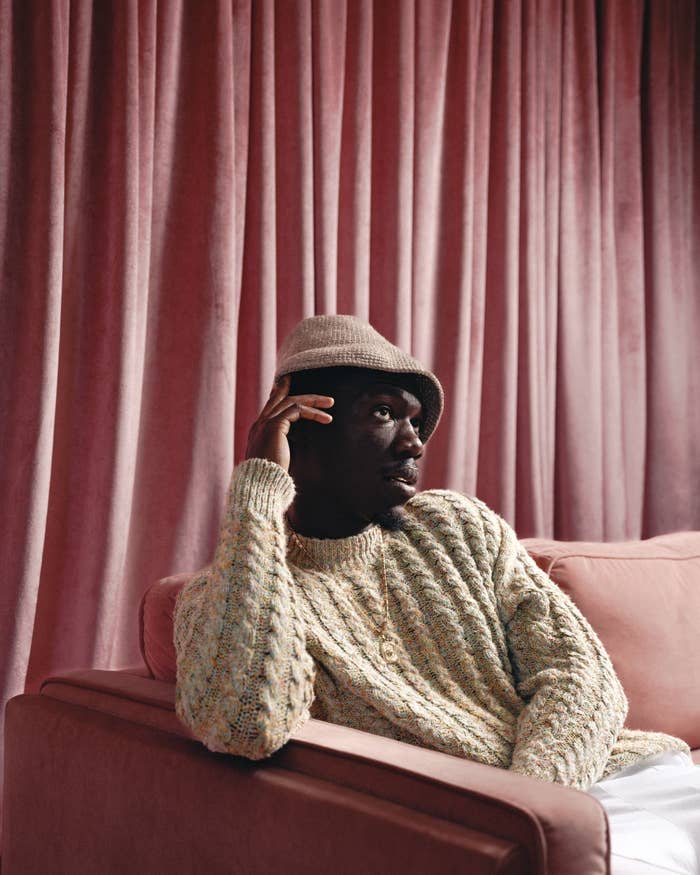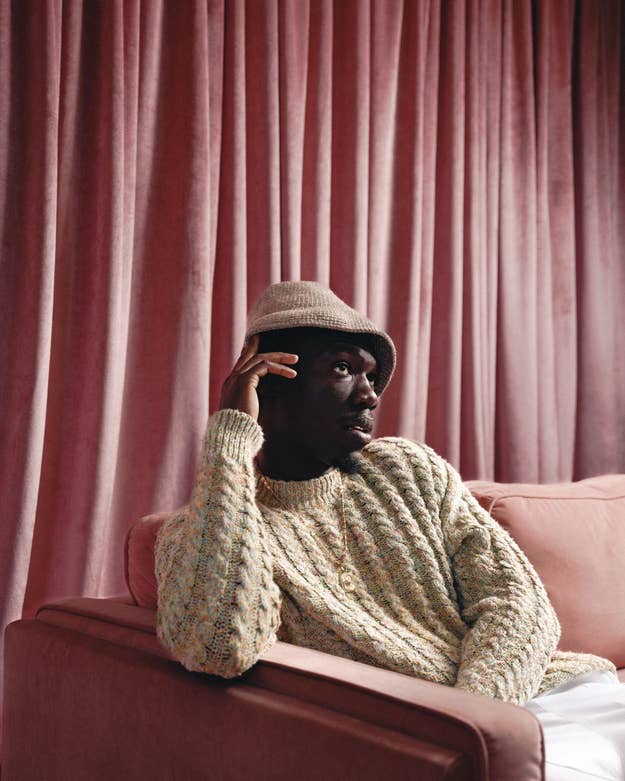
Over the course of his decade-long career, Maryland rapper Foggieraw has undergone a number of transitions artistically and creatively, including a name change, experimentation with genre and style, and, most recently, a calculated twist in how he markets his music.
Foggieraw, formerly known as Jayo, recently came into his own as a rapper with a charismatic persona, an animated flow, and an overall unique style. Lyrically adept, Foggie’s rap style is vivid and poetic. He navigates his wordplay with the precision of a master craftsman, deploying bars and punchlines that are engrossingly descriptive, unsuspectingly witty, and exude an aura of effortless charm. He first began releasing music in 2013; he then formally introduced himself in 2016 with the release of his debut EP The Foggie Pound. The five-track EP contained the very first song from the 30-year-old to gain significant traction in his home city: a minimal, wordplay-heavy two-minute rap cut titled “30 and 10” that put him in the conversation as one of Maryland’s new artists to watch.
But, over the last few months, the Ghanian, Maryland native has garnered attention for two distinct things—the quality of his visuals and his unique approach to releasing music in that he almost exclusively releases songs in video form, on social media platforms. Most recently, he delivered a two-pack release called The Foggie Pound 3, containing “Psalm 62,” the 68-second video clip featuring smooth verses over the instrumental of the timeless R&B classic “You Don’t Know My Name” by Alicia Keys, and “Ms. Johnson,” a remake of Musiq Soulchild’s “Teachme,” another classic R&B song. Alicia cleared the sample on “Psalm 62” for Foggie, an occurrence that doesn’t happen often for the R&B and soul icon. They’ve also been in the studio together, a clear co-sign for the legendary American singer.
“I was on the floor when I found out she was gonna clear the sample for me,” he tells Complex. “I know she had rarely cleared that sample before so I was up against the world but, you know. I was just so happy.”
"I was on the floor when I found out she was gonna clear the sample for me."
Foggieraw, born Jesse Owusu, understands the need to go the extra mile to make sure his music gets the eyes and ears that it deserves, with the least delay possible. And it’s worked. Foggie has an audience of over 300,000 followers on Instagram and over 500,000 followers on TikTok. The attraction? Painfully brief songs all under 90 seconds, which Foggie refers to as “poems.” These songs are specifically tailored for and uploaded on video-sharing apps, and up until now, the only way to experience them has been on Foggie’s socials. Since he started posting these songs in 2021 (with the first being an untitled, 44-second clip of Foggie performing a verse), they have racked up views ranging from the hundreds of thousands to the millions on TikTok, the lowest having 67,000 views, and the highest currently having 9 million views.
Social media has become an essential element of music marketing; 67% of TikTok’s users are likely to seek out songs on streaming services after hearing them on the app, and 2.35 billion people interact with Instagram reels every month.Artists and record labels include social media platforms as a critical pillar of their marketing rollouts. However, Foggieraw’s reasoning for using social media as the main tool for sharing his music goes beyond that. It’s about artistic freedom, and speed. “I got tired of the process of releasing music,” he remarked. “You gotta make the music, which takes however long it takes. Then you gotta go record it, mix it, cover art, all of that. Then you gotta shoot a video, which takes another one to two weeks. Then you gotta send it to DSPs for a month so they can look so I just wanna do the song Monday, shoot the video Tuesday, and put it out Wednesday. I don’t even care if I get any money from it—I just wanna do it. And that’s what I started doing.”
On June 16, 2023, Foggie made his most-watched video, “Psalm 62,” available on streaming platforms, nine months after its initial release on Instagram and TikTok. It racked up a total 9 million views on TikTok in less than a year, and now it and “Ms. Johnson,” another well-received poem of his, can be streamed anywhere music is found. The decision to make “Psalm 62” available in a more traditional format can be attributed to the buzz generated from the video, as well as incessant requests from his fans. To make that happen the rapper did everything in his power to get the Alicia sample cleared, but when all else failed he issued the task to his fans, asking them to politely ask her to grant his humble request. Foggie’s dedicated fans successfully caught Alicia’s attention, leading to her eventually responding to Foggie’s tweet and inviting him to meet her in person. The day after they met, The Foggie Pound 3 was released.
However, social media isn’t the sole reason for Foggie’s growing popularity. Another key part of the PG County rapper’s rollouts are the visuals. He directs his own videos and is particular about the way he tells stories. “I’ve always been really into visuals,” the rapper explains. “I’m super into old movies. Even all my friends will tell you, when I like a movie I’ll watch the movie over and over, whether it’s like 30, 40, or 50 times. I just love visuals and that type of storytelling.” That passion is likely connected to the fact that he’s an avid film aficionado who graduated with a theatre arts minor from Bowie State University. “I just see it like the effort put into the visuals and trying to channel my vision through the acting, or piecing out different inspirations I have through the visuals—I feel like that’s what’s really driving it home or moving the needle,” he continues. The end results are creative, evocative endeavors to illustrate the messages being communicated in his lyrics—which include everything from failed relationships to religion.
Assisted by Nehemiah Wilson on videography and Logan Weaver on styling, Foggie’s music videos capture the vision resident in his mind for each song. In the video for “SS Tricky,” which plays like a short film from the era of black-and-white cinema, Foggie casually trails a love interest through an antiquated set, held in view by deliberately compacted camera angles that leave you anticipating what happens next with each transition. To him, how he presents his art is just as important as the art itself, and he knows it’s a key factor in how his art is received. “I just see it like the effort put into the visuals and trying to channel my vision through the acting, or piecing out different inspirations I have through the visuals—I feel like that’s what’s really driving it home or moving the needle,” he says.
Foggie’s hypothesis is proven true through significant co-signs by his fellow creatives in the industry, as Alicia Keys isn’t the only one who's been captivated by his work. Artists like Ari Lennox, IDK, SZA, Anderson .Paak, Benny Blanco, Tierra Whack, and more have all taken notice of Foggie, praising the innovative method to his lyrics and his content. “It’s always an honor to be appreciated by your peers, and legends as well,” he remarked. But with Foggie’s approach to his music comes the question of whether his mode of delivery could be a limitation in terms of how he is perceived as an artist.
"For me it’s not even about getting the acclaim for the art; it’s just about being able to make it, putting it out there, and it being able to affect people’s lives."
When asked if he’s concerned about the possibility of being put in a box as a “social media artist,” he sounds unperturbed. “So basically, I know for me, I don’t care how people categorize or perceive me. The things that I’m doing, the things that I’m trying to do even transcends genre,” he explains. “It’s just art, and you can’t call art anything—you can’t box it in. It’s just you see it, you hear it, and you appreciate it. I just know for me I would never categorize myself. I would never put a genre on myself. I would never put a box on myself. I just make the art. And as long as I can do that the way I envision in my head, I’m cool at the end of the day.”
Foggieraw speaks with the air of an artist who sees the craft of making music as sacred. In terms of vision, he’s thinking decades down the line. When asked what he wants to be known for, he issues a response that flows so naturally one might easily think it’s rehearsed, but a keen ear can tell that it comes from a place of ambition and deep introspection. “I want to be known as somebody who was pure when it came to art, who never cheated art as a whole," he says. "Everybody knows about Vincent van Gogh. His story was moreso [that] he put so much work into his art for so many years, and then he only got famous for his art after he died. I’m okay if that happens for me. ‘Cause for me it’s not even about getting the acclaim for the art; it’s just about being able to make it, putting it out there, and it being able to affect people’s lives. That’s what I want to be known for.”

